Reflective Report: EVRE Module, Self-Assessment and Learning Process
VerifiedAdded on 2023/01/19
|17
|5234
|76
Report
AI Summary
This report presents a detailed reflection on the Evaluation and Reflection (EVRE) module, focusing on the student's self-assessment journey and learning experiences. The report begins with an introduction to reflection as a process for personal and professional development, highlighting the link between the EVRE module and the Project and Placement Design and Implementation (PPDI) module. The student reflects on various activities, including the Johari window model, and discusses the insights gained regarding their strengths, weaknesses, and hidden talents. The report further explores the benefits of reflective writing and the use of reflective journals. It then details the activities of each week, including the restaurant scene activity, table tasks, and the DISC test, and how these activities facilitated learning about self-assessment, perception, and communication styles. The report delves into various reflective models, such as Boud's and Gibb's reflective cycles, and their application in understanding and analyzing experiences. Finally, it explores other reflective models like Belbin, Lawrence-Wilkes and Ashmore model and Kolb's model. The report concludes with an emphasis on the importance of reflection in professional development and critical thinking.
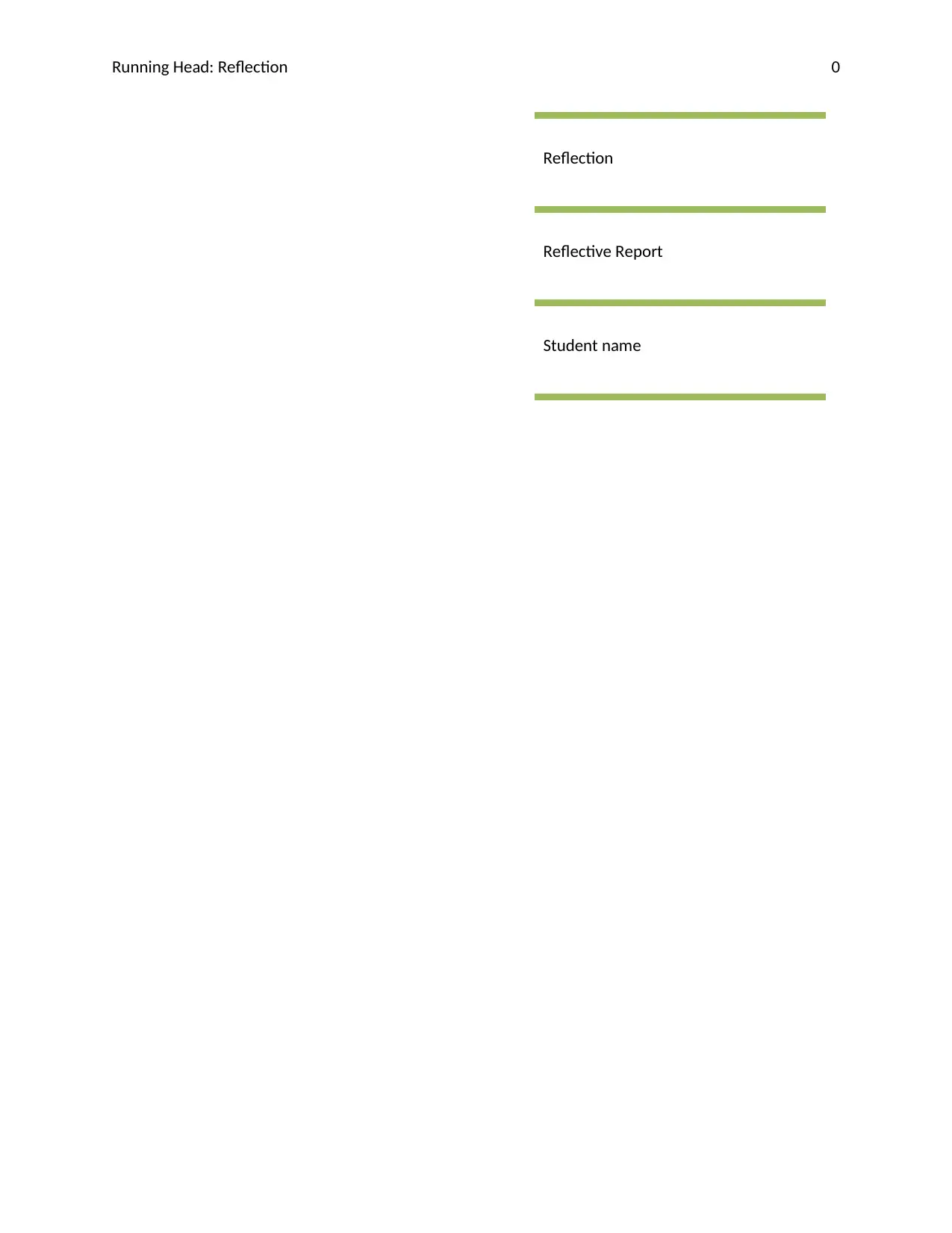
Running Head: Reflection 0
Reflection
Reflective Report
Student name
Reflection
Reflective Report
Student name
Paraphrase This Document
Need a fresh take? Get an instant paraphrase of this document with our AI Paraphraser
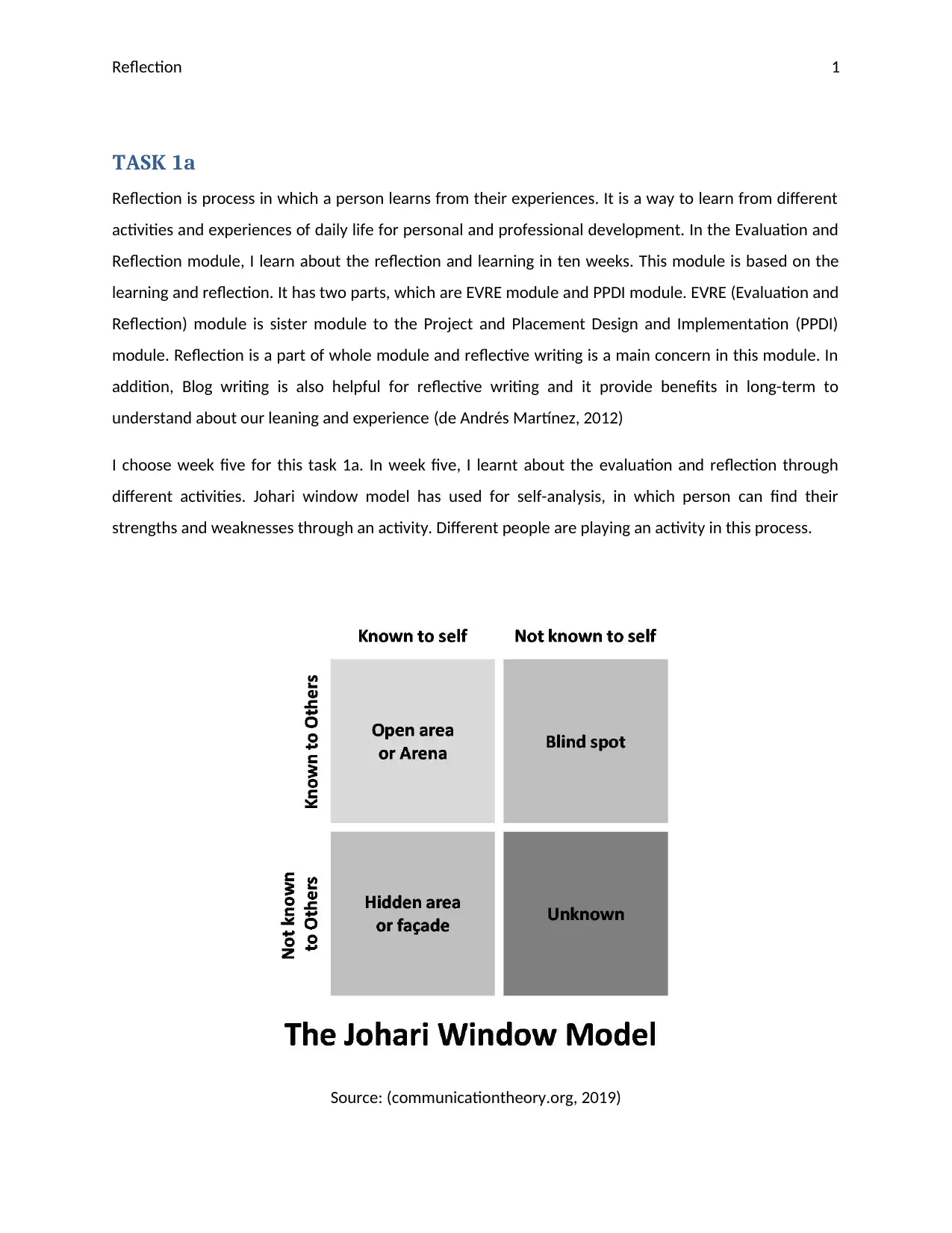
Reflection 1
TASK 1a
Reflection is process in which a person learns from their experiences. It is a way to learn from different
activities and experiences of daily life for personal and professional development. In the Evaluation and
Reflection module, I learn about the reflection and learning in ten weeks. This module is based on the
learning and reflection. It has two parts, which are EVRE module and PPDI module. EVRE (Evaluation and
Reflection) module is sister module to the Project and Placement Design and Implementation (PPDI)
module. Reflection is a part of whole module and reflective writing is a main concern in this module. In
addition, Blog writing is also helpful for reflective writing and it provide benefits in long-term to
understand about our leaning and experience (de Andrés Martínez, 2012)
I choose week five for this task 1a. In week five, I learnt about the evaluation and reflection through
different activities. Johari window model has used for self-analysis, in which person can find their
strengths and weaknesses through an activity. Different people are playing an activity in this process.
Source: (communicationtheory.org, 2019)
TASK 1a
Reflection is process in which a person learns from their experiences. It is a way to learn from different
activities and experiences of daily life for personal and professional development. In the Evaluation and
Reflection module, I learn about the reflection and learning in ten weeks. This module is based on the
learning and reflection. It has two parts, which are EVRE module and PPDI module. EVRE (Evaluation and
Reflection) module is sister module to the Project and Placement Design and Implementation (PPDI)
module. Reflection is a part of whole module and reflective writing is a main concern in this module. In
addition, Blog writing is also helpful for reflective writing and it provide benefits in long-term to
understand about our leaning and experience (de Andrés Martínez, 2012)
I choose week five for this task 1a. In week five, I learnt about the evaluation and reflection through
different activities. Johari window model has used for self-analysis, in which person can find their
strengths and weaknesses through an activity. Different people are playing an activity in this process.
Source: (communicationtheory.org, 2019)
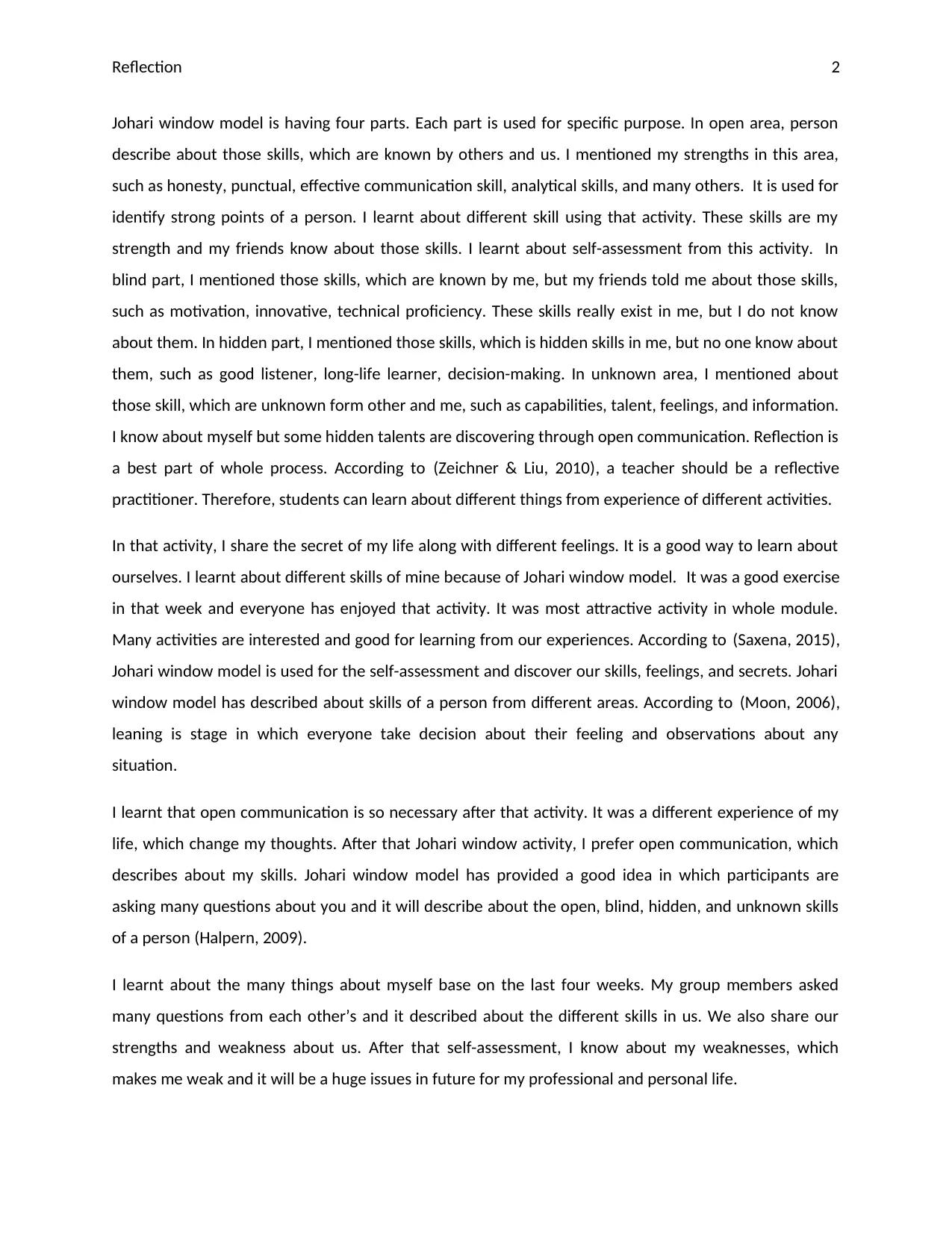
Reflection 2
Johari window model is having four parts. Each part is used for specific purpose. In open area, person
describe about those skills, which are known by others and us. I mentioned my strengths in this area,
such as honesty, punctual, effective communication skill, analytical skills, and many others. It is used for
identify strong points of a person. I learnt about different skill using that activity. These skills are my
strength and my friends know about those skills. I learnt about self-assessment from this activity. In
blind part, I mentioned those skills, which are known by me, but my friends told me about those skills,
such as motivation, innovative, technical proficiency. These skills really exist in me, but I do not know
about them. In hidden part, I mentioned those skills, which is hidden skills in me, but no one know about
them, such as good listener, long-life learner, decision-making. In unknown area, I mentioned about
those skill, which are unknown form other and me, such as capabilities, talent, feelings, and information.
I know about myself but some hidden talents are discovering through open communication. Reflection is
a best part of whole process. According to (Zeichner & Liu, 2010), a teacher should be a reflective
practitioner. Therefore, students can learn about different things from experience of different activities.
In that activity, I share the secret of my life along with different feelings. It is a good way to learn about
ourselves. I learnt about different skills of mine because of Johari window model. It was a good exercise
in that week and everyone has enjoyed that activity. It was most attractive activity in whole module.
Many activities are interested and good for learning from our experiences. According to (Saxena, 2015),
Johari window model is used for the self-assessment and discover our skills, feelings, and secrets. Johari
window model has described about skills of a person from different areas. According to (Moon, 2006),
leaning is stage in which everyone take decision about their feeling and observations about any
situation.
I learnt that open communication is so necessary after that activity. It was a different experience of my
life, which change my thoughts. After that Johari window activity, I prefer open communication, which
describes about my skills. Johari window model has provided a good idea in which participants are
asking many questions about you and it will describe about the open, blind, hidden, and unknown skills
of a person (Halpern, 2009).
I learnt about the many things about myself base on the last four weeks. My group members asked
many questions from each other’s and it described about the different skills in us. We also share our
strengths and weakness about us. After that self-assessment, I know about my weaknesses, which
makes me weak and it will be a huge issues in future for my professional and personal life.
Johari window model is having four parts. Each part is used for specific purpose. In open area, person
describe about those skills, which are known by others and us. I mentioned my strengths in this area,
such as honesty, punctual, effective communication skill, analytical skills, and many others. It is used for
identify strong points of a person. I learnt about different skill using that activity. These skills are my
strength and my friends know about those skills. I learnt about self-assessment from this activity. In
blind part, I mentioned those skills, which are known by me, but my friends told me about those skills,
such as motivation, innovative, technical proficiency. These skills really exist in me, but I do not know
about them. In hidden part, I mentioned those skills, which is hidden skills in me, but no one know about
them, such as good listener, long-life learner, decision-making. In unknown area, I mentioned about
those skill, which are unknown form other and me, such as capabilities, talent, feelings, and information.
I know about myself but some hidden talents are discovering through open communication. Reflection is
a best part of whole process. According to (Zeichner & Liu, 2010), a teacher should be a reflective
practitioner. Therefore, students can learn about different things from experience of different activities.
In that activity, I share the secret of my life along with different feelings. It is a good way to learn about
ourselves. I learnt about different skills of mine because of Johari window model. It was a good exercise
in that week and everyone has enjoyed that activity. It was most attractive activity in whole module.
Many activities are interested and good for learning from our experiences. According to (Saxena, 2015),
Johari window model is used for the self-assessment and discover our skills, feelings, and secrets. Johari
window model has described about skills of a person from different areas. According to (Moon, 2006),
leaning is stage in which everyone take decision about their feeling and observations about any
situation.
I learnt that open communication is so necessary after that activity. It was a different experience of my
life, which change my thoughts. After that Johari window activity, I prefer open communication, which
describes about my skills. Johari window model has provided a good idea in which participants are
asking many questions about you and it will describe about the open, blind, hidden, and unknown skills
of a person (Halpern, 2009).
I learnt about the many things about myself base on the last four weeks. My group members asked
many questions from each other’s and it described about the different skills in us. We also share our
strengths and weakness about us. After that self-assessment, I know about my weaknesses, which
makes me weak and it will be a huge issues in future for my professional and personal life.
⊘ This is a preview!⊘
Do you want full access?
Subscribe today to unlock all pages.

Trusted by 1+ million students worldwide
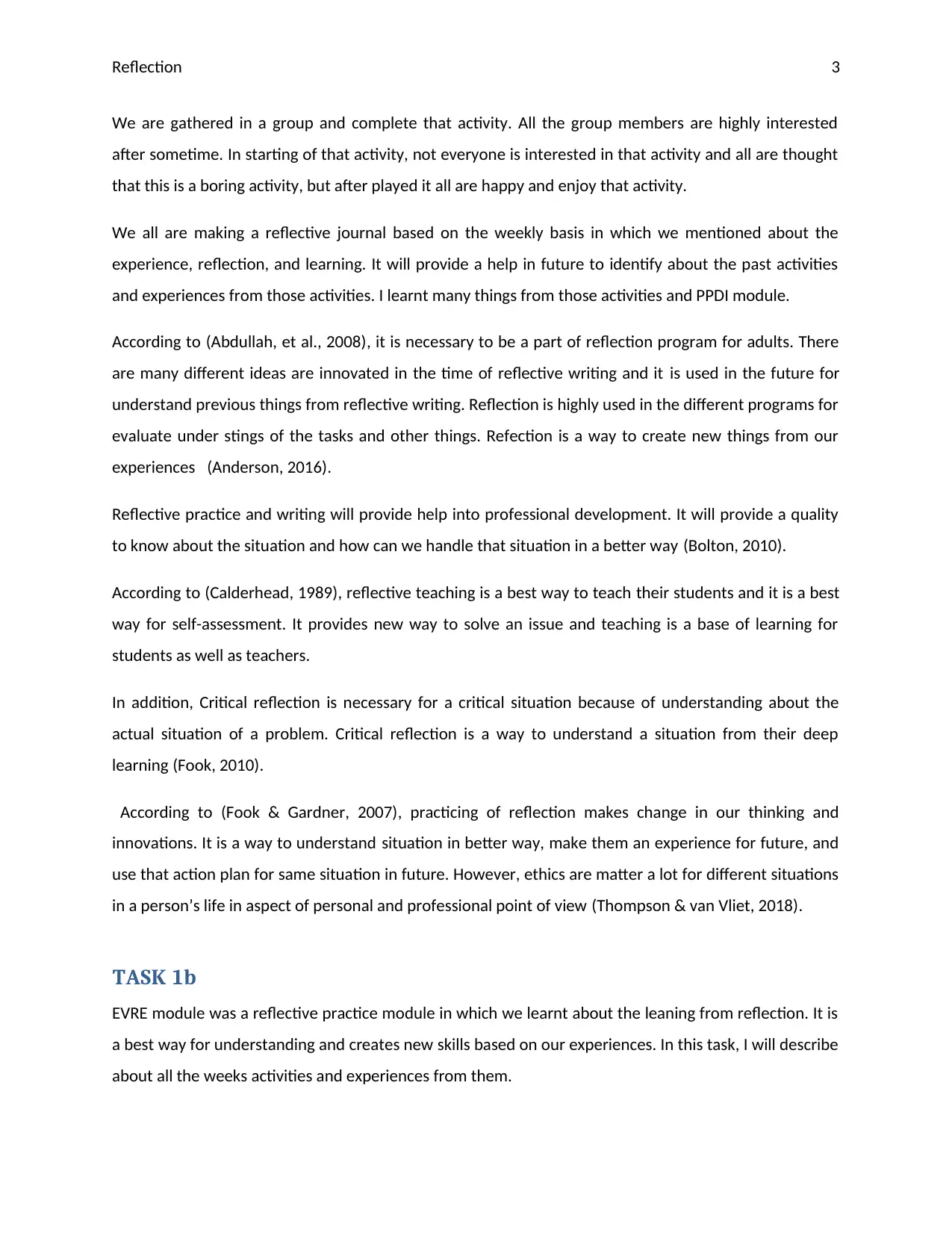
Reflection 3
We are gathered in a group and complete that activity. All the group members are highly interested
after sometime. In starting of that activity, not everyone is interested in that activity and all are thought
that this is a boring activity, but after played it all are happy and enjoy that activity.
We all are making a reflective journal based on the weekly basis in which we mentioned about the
experience, reflection, and learning. It will provide a help in future to identify about the past activities
and experiences from those activities. I learnt many things from those activities and PPDI module.
According to (Abdullah, et al., 2008), it is necessary to be a part of reflection program for adults. There
are many different ideas are innovated in the time of reflective writing and it is used in the future for
understand previous things from reflective writing. Reflection is highly used in the different programs for
evaluate under stings of the tasks and other things. Refection is a way to create new things from our
experiences (Anderson, 2016).
Reflective practice and writing will provide help into professional development. It will provide a quality
to know about the situation and how can we handle that situation in a better way (Bolton, 2010).
According to (Calderhead, 1989), reflective teaching is a best way to teach their students and it is a best
way for self-assessment. It provides new way to solve an issue and teaching is a base of learning for
students as well as teachers.
In addition, Critical reflection is necessary for a critical situation because of understanding about the
actual situation of a problem. Critical reflection is a way to understand a situation from their deep
learning (Fook, 2010).
According to (Fook & Gardner, 2007), practicing of reflection makes change in our thinking and
innovations. It is a way to understand situation in better way, make them an experience for future, and
use that action plan for same situation in future. However, ethics are matter a lot for different situations
in a person’s life in aspect of personal and professional point of view (Thompson & van Vliet, 2018).
TASK 1b
EVRE module was a reflective practice module in which we learnt about the leaning from reflection. It is
a best way for understanding and creates new skills based on our experiences. In this task, I will describe
about all the weeks activities and experiences from them.
We are gathered in a group and complete that activity. All the group members are highly interested
after sometime. In starting of that activity, not everyone is interested in that activity and all are thought
that this is a boring activity, but after played it all are happy and enjoy that activity.
We all are making a reflective journal based on the weekly basis in which we mentioned about the
experience, reflection, and learning. It will provide a help in future to identify about the past activities
and experiences from those activities. I learnt many things from those activities and PPDI module.
According to (Abdullah, et al., 2008), it is necessary to be a part of reflection program for adults. There
are many different ideas are innovated in the time of reflective writing and it is used in the future for
understand previous things from reflective writing. Reflection is highly used in the different programs for
evaluate under stings of the tasks and other things. Refection is a way to create new things from our
experiences (Anderson, 2016).
Reflective practice and writing will provide help into professional development. It will provide a quality
to know about the situation and how can we handle that situation in a better way (Bolton, 2010).
According to (Calderhead, 1989), reflective teaching is a best way to teach their students and it is a best
way for self-assessment. It provides new way to solve an issue and teaching is a base of learning for
students as well as teachers.
In addition, Critical reflection is necessary for a critical situation because of understanding about the
actual situation of a problem. Critical reflection is a way to understand a situation from their deep
learning (Fook, 2010).
According to (Fook & Gardner, 2007), practicing of reflection makes change in our thinking and
innovations. It is a way to understand situation in better way, make them an experience for future, and
use that action plan for same situation in future. However, ethics are matter a lot for different situations
in a person’s life in aspect of personal and professional point of view (Thompson & van Vliet, 2018).
TASK 1b
EVRE module was a reflective practice module in which we learnt about the leaning from reflection. It is
a best way for understanding and creates new skills based on our experiences. In this task, I will describe
about all the weeks activities and experiences from them.
Paraphrase This Document
Need a fresh take? Get an instant paraphrase of this document with our AI Paraphraser

Reflection 4
In first week, we all have a self-assessment activity in which we have divide into group of five people. A
restaurant scene was given to all of us in an activity. In that scene, a restaurant reviewer sits down in a
restaurant to eat and orders food and after he has eaten most of his food he leaves and he given a
terrible review to the restaurant. Therefore, whole class divided in-group of five and each group to
discuss and answer the two questions, which are as:
1. What happened?
2. Whose fault was it?
In that activity, we played role of different people, which are owner of the restaurant, head chef,
assistant chef, server, and food supplier. In first task, we all share over views about that incident and in
second task, after hearing whom each group thinks is to blame, now ask different question from same
group that if restaurant had first class review then what would we do differently. It was an awesome
activity to understand different situation and self-assessment in different conditions.
In second week of EVRE module, we had a great table task, in which every group makes perception
based on the given condition. It is a best way to leant about the presence of mind in different situations.
It was a task in which group and individual perceptions are considered. We all have same terms in visual
perception and audio perception activity. I also learnt about the VAL communication style in that week.
We all have a journal activity in which we have to mention about three things based on individuals
learning from each week, which is experience, reflection and learning. It was a best way to provide
benefits of activities in long-term. In that reflection journal, I mentioned about my experience,
revelation, and learning from that week activities and other things. Beside it, it was the key significant
things happened in PDDI module and EVRE module. I learnt that self-assessment activities are helpful for
the personal learning as well as professional development. I learnt about the subjective and objective
reframing from that week. According to (Dowd, 2018), an employee should have different skills to solve
different issues at their workplace in a proper way.
I learnt about the reflection definitions, EQ, and emotional regulation. In this week, we learnt about the
Dewey’s model, Argris and Schon’s model during that week, which are best for understanding about
reflection and learning.
In week third, I learnt about the disc test, which is a tool that provide a reflective journey throughout
this module in the end of the module. It really helped me to see my natural disposition to reflection. I
In first week, we all have a self-assessment activity in which we have divide into group of five people. A
restaurant scene was given to all of us in an activity. In that scene, a restaurant reviewer sits down in a
restaurant to eat and orders food and after he has eaten most of his food he leaves and he given a
terrible review to the restaurant. Therefore, whole class divided in-group of five and each group to
discuss and answer the two questions, which are as:
1. What happened?
2. Whose fault was it?
In that activity, we played role of different people, which are owner of the restaurant, head chef,
assistant chef, server, and food supplier. In first task, we all share over views about that incident and in
second task, after hearing whom each group thinks is to blame, now ask different question from same
group that if restaurant had first class review then what would we do differently. It was an awesome
activity to understand different situation and self-assessment in different conditions.
In second week of EVRE module, we had a great table task, in which every group makes perception
based on the given condition. It is a best way to leant about the presence of mind in different situations.
It was a task in which group and individual perceptions are considered. We all have same terms in visual
perception and audio perception activity. I also learnt about the VAL communication style in that week.
We all have a journal activity in which we have to mention about three things based on individuals
learning from each week, which is experience, reflection and learning. It was a best way to provide
benefits of activities in long-term. In that reflection journal, I mentioned about my experience,
revelation, and learning from that week activities and other things. Beside it, it was the key significant
things happened in PDDI module and EVRE module. I learnt that self-assessment activities are helpful for
the personal learning as well as professional development. I learnt about the subjective and objective
reframing from that week. According to (Dowd, 2018), an employee should have different skills to solve
different issues at their workplace in a proper way.
I learnt about the reflection definitions, EQ, and emotional regulation. In this week, we learnt about the
Dewey’s model, Argris and Schon’s model during that week, which are best for understanding about
reflection and learning.
In week third, I learnt about the disc test, which is a tool that provide a reflective journey throughout
this module in the end of the module. It really helped me to see my natural disposition to reflection. I

Reflection 5
shared my result into class as well as my tutor. We also had an activity in that week in which we play a
role of musician and learnt about misperception.
In this week, I leant about two important model of reflection, which are Boud and Gibb’s model.
Source: (andrewwikaira.blogspot.com, 2015)
Boud reflection model has three steps, which are experience, reflection, and learning. All three steps are
connected which each other. I used this model for whole week activities and reflective journal writing
after every week activity. According to (Gray, 2007), reflective tools are useful for the understudying
power of reflection and its benefits in personal and professional development.
Gibb’s reflective cycle is highly used for reflection and learning from our experience. It was a best model,
which I like in that whole EVRE module. I applied this model in my professional life and I found that it
provides better results. It has six stages, which are connected with each other. It can start from any
stage and it starts from description of anything. It used to analyses a situation. Next step is feeling in
which we can share about our feeling and thinking about that situation or condition. After that, we can
decide about the right and wrong about the experience. It is an evaluation stage, which provides that
what was bad and good about the experience. Next stage is analysis in which we can analysis about the
situation and make a decision about the situation. Next stage is conclusion, which is a pert that explains
about the whole situation. In that condition, what else could we have done? Next step is action plan,
which is based on whole cycle in which we can use in future for same situation. In addition, (Friedman,
2016), an employee should have essential skills to develop their professional career.
shared my result into class as well as my tutor. We also had an activity in that week in which we play a
role of musician and learnt about misperception.
In this week, I leant about two important model of reflection, which are Boud and Gibb’s model.
Source: (andrewwikaira.blogspot.com, 2015)
Boud reflection model has three steps, which are experience, reflection, and learning. All three steps are
connected which each other. I used this model for whole week activities and reflective journal writing
after every week activity. According to (Gray, 2007), reflective tools are useful for the understudying
power of reflection and its benefits in personal and professional development.
Gibb’s reflective cycle is highly used for reflection and learning from our experience. It was a best model,
which I like in that whole EVRE module. I applied this model in my professional life and I found that it
provides better results. It has six stages, which are connected with each other. It can start from any
stage and it starts from description of anything. It used to analyses a situation. Next step is feeling in
which we can share about our feeling and thinking about that situation or condition. After that, we can
decide about the right and wrong about the experience. It is an evaluation stage, which provides that
what was bad and good about the experience. Next stage is analysis in which we can analysis about the
situation and make a decision about the situation. Next stage is conclusion, which is a pert that explains
about the whole situation. In that condition, what else could we have done? Next step is action plan,
which is based on whole cycle in which we can use in future for same situation. In addition, (Friedman,
2016), an employee should have essential skills to develop their professional career.
⊘ This is a preview!⊘
Do you want full access?
Subscribe today to unlock all pages.

Trusted by 1+ million students worldwide
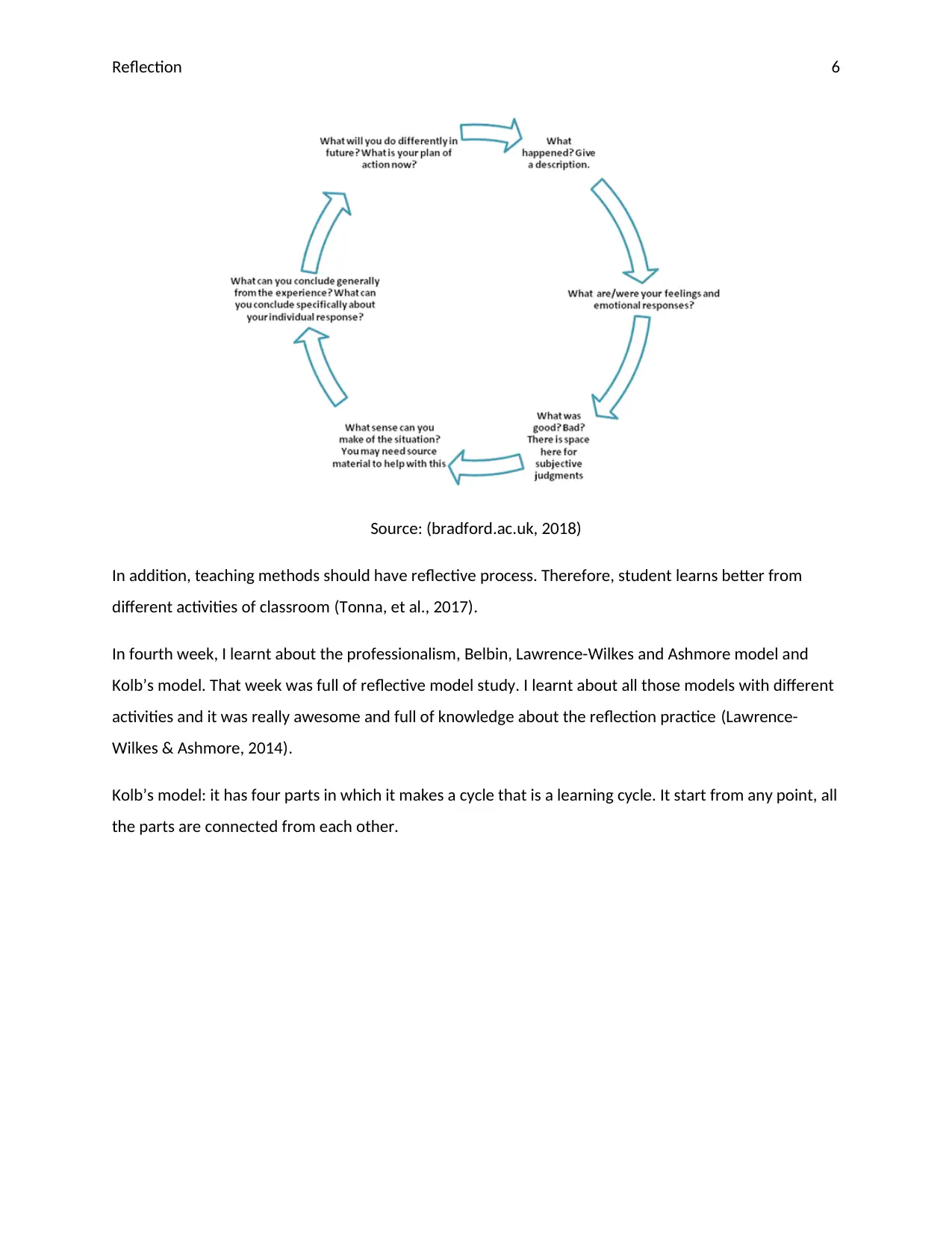
Reflection 6
Source: (bradford.ac.uk, 2018)
In addition, teaching methods should have reflective process. Therefore, student learns better from
different activities of classroom (Tonna, et al., 2017).
In fourth week, I learnt about the professionalism, Belbin, Lawrence-Wilkes and Ashmore model and
Kolb’s model. That week was full of reflective model study. I learnt about all those models with different
activities and it was really awesome and full of knowledge about the reflection practice (Lawrence-
Wilkes & Ashmore, 2014).
Kolb’s model: it has four parts in which it makes a cycle that is a learning cycle. It start from any point, all
the parts are connected from each other.
Source: (bradford.ac.uk, 2018)
In addition, teaching methods should have reflective process. Therefore, student learns better from
different activities of classroom (Tonna, et al., 2017).
In fourth week, I learnt about the professionalism, Belbin, Lawrence-Wilkes and Ashmore model and
Kolb’s model. That week was full of reflective model study. I learnt about all those models with different
activities and it was really awesome and full of knowledge about the reflection practice (Lawrence-
Wilkes & Ashmore, 2014).
Kolb’s model: it has four parts in which it makes a cycle that is a learning cycle. It start from any point, all
the parts are connected from each other.
Paraphrase This Document
Need a fresh take? Get an instant paraphrase of this document with our AI Paraphraser
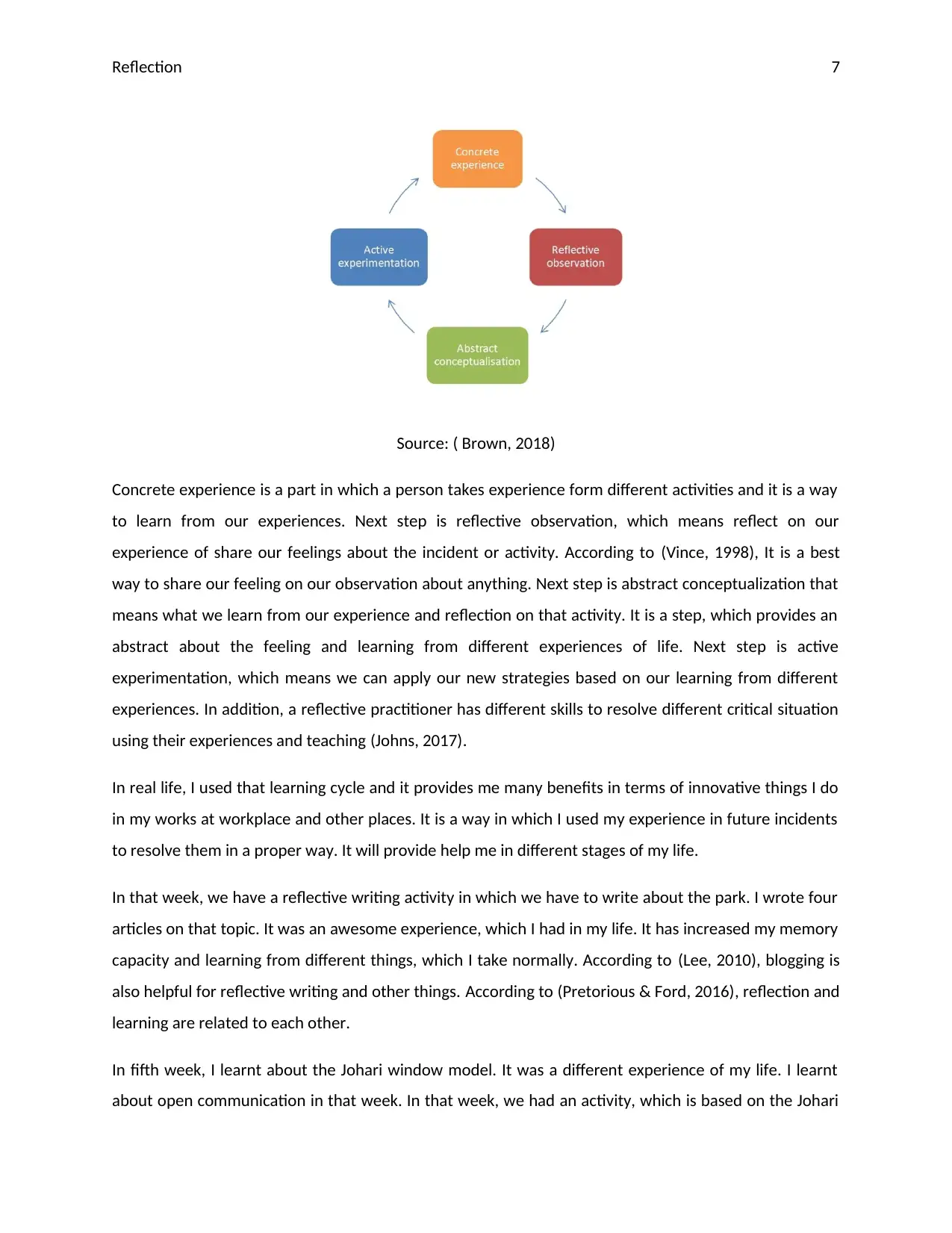
Reflection 7
Source: ( Brown, 2018)
Concrete experience is a part in which a person takes experience form different activities and it is a way
to learn from our experiences. Next step is reflective observation, which means reflect on our
experience of share our feelings about the incident or activity. According to (Vince, 1998), It is a best
way to share our feeling on our observation about anything. Next step is abstract conceptualization that
means what we learn from our experience and reflection on that activity. It is a step, which provides an
abstract about the feeling and learning from different experiences of life. Next step is active
experimentation, which means we can apply our new strategies based on our learning from different
experiences. In addition, a reflective practitioner has different skills to resolve different critical situation
using their experiences and teaching (Johns, 2017).
In real life, I used that learning cycle and it provides me many benefits in terms of innovative things I do
in my works at workplace and other places. It is a way in which I used my experience in future incidents
to resolve them in a proper way. It will provide help me in different stages of my life.
In that week, we have a reflective writing activity in which we have to write about the park. I wrote four
articles on that topic. It was an awesome experience, which I had in my life. It has increased my memory
capacity and learning from different things, which I take normally. According to (Lee, 2010), blogging is
also helpful for reflective writing and other things. According to (Pretorious & Ford, 2016), reflection and
learning are related to each other.
In fifth week, I learnt about the Johari window model. It was a different experience of my life. I learnt
about open communication in that week. In that week, we had an activity, which is based on the Johari
Source: ( Brown, 2018)
Concrete experience is a part in which a person takes experience form different activities and it is a way
to learn from our experiences. Next step is reflective observation, which means reflect on our
experience of share our feelings about the incident or activity. According to (Vince, 1998), It is a best
way to share our feeling on our observation about anything. Next step is abstract conceptualization that
means what we learn from our experience and reflection on that activity. It is a step, which provides an
abstract about the feeling and learning from different experiences of life. Next step is active
experimentation, which means we can apply our new strategies based on our learning from different
experiences. In addition, a reflective practitioner has different skills to resolve different critical situation
using their experiences and teaching (Johns, 2017).
In real life, I used that learning cycle and it provides me many benefits in terms of innovative things I do
in my works at workplace and other places. It is a way in which I used my experience in future incidents
to resolve them in a proper way. It will provide help me in different stages of my life.
In that week, we have a reflective writing activity in which we have to write about the park. I wrote four
articles on that topic. It was an awesome experience, which I had in my life. It has increased my memory
capacity and learning from different things, which I take normally. According to (Lee, 2010), blogging is
also helpful for reflective writing and other things. According to (Pretorious & Ford, 2016), reflection and
learning are related to each other.
In fifth week, I learnt about the Johari window model. It was a different experience of my life. I learnt
about open communication in that week. In that week, we had an activity, which is based on the Johari
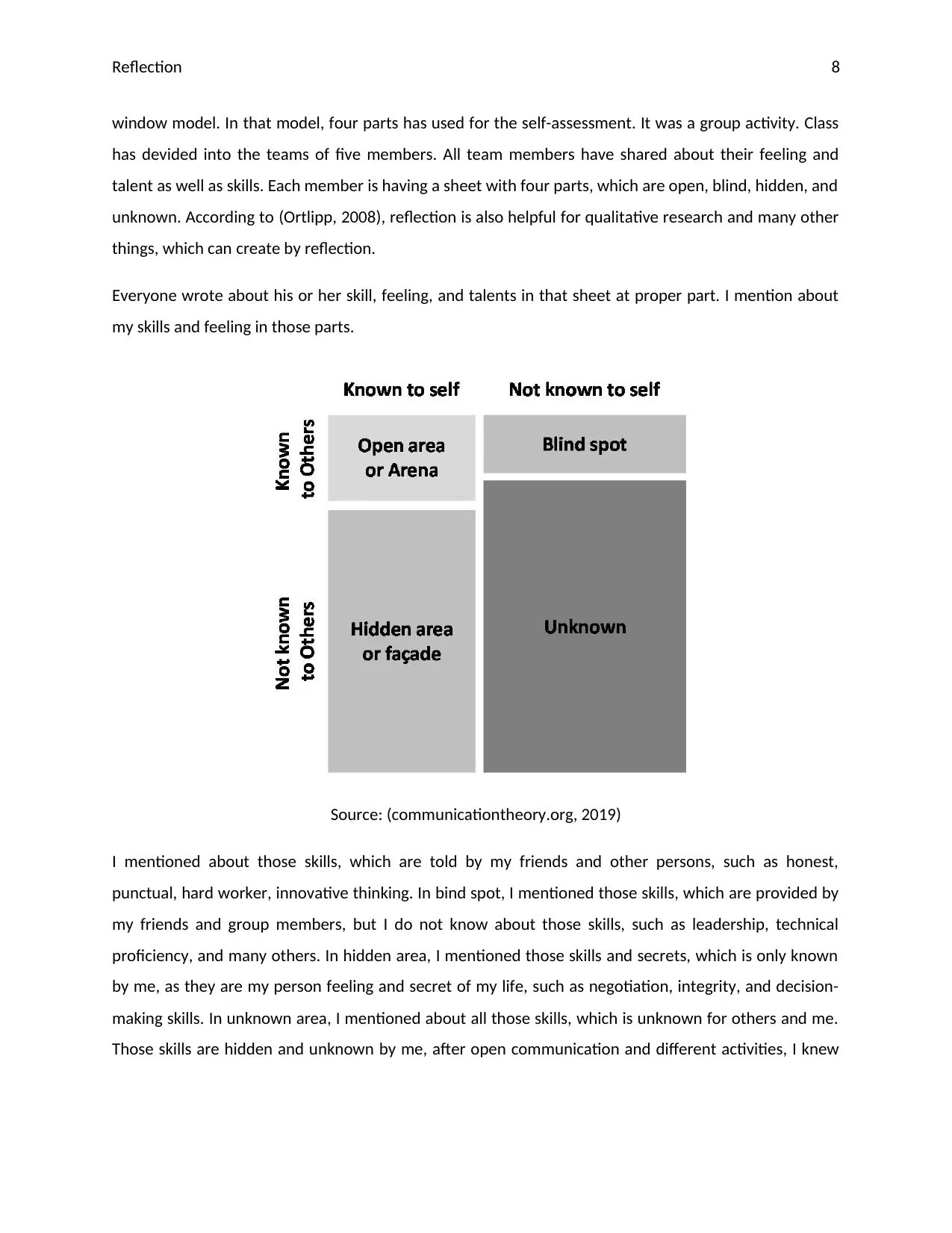
Reflection 8
window model. In that model, four parts has used for the self-assessment. It was a group activity. Class
has devided into the teams of five members. All team members have shared about their feeling and
talent as well as skills. Each member is having a sheet with four parts, which are open, blind, hidden, and
unknown. According to (Ortlipp, 2008), reflection is also helpful for qualitative research and many other
things, which can create by reflection.
Everyone wrote about his or her skill, feeling, and talents in that sheet at proper part. I mention about
my skills and feeling in those parts.
Source: (communicationtheory.org, 2019)
I mentioned about those skills, which are told by my friends and other persons, such as honest,
punctual, hard worker, innovative thinking. In bind spot, I mentioned those skills, which are provided by
my friends and group members, but I do not know about those skills, such as leadership, technical
proficiency, and many others. In hidden area, I mentioned those skills and secrets, which is only known
by me, as they are my person feeling and secret of my life, such as negotiation, integrity, and decision-
making skills. In unknown area, I mentioned about all those skills, which is unknown for others and me.
Those skills are hidden and unknown by me, after open communication and different activities, I knew
window model. In that model, four parts has used for the self-assessment. It was a group activity. Class
has devided into the teams of five members. All team members have shared about their feeling and
talent as well as skills. Each member is having a sheet with four parts, which are open, blind, hidden, and
unknown. According to (Ortlipp, 2008), reflection is also helpful for qualitative research and many other
things, which can create by reflection.
Everyone wrote about his or her skill, feeling, and talents in that sheet at proper part. I mention about
my skills and feeling in those parts.
Source: (communicationtheory.org, 2019)
I mentioned about those skills, which are told by my friends and other persons, such as honest,
punctual, hard worker, innovative thinking. In bind spot, I mentioned those skills, which are provided by
my friends and group members, but I do not know about those skills, such as leadership, technical
proficiency, and many others. In hidden area, I mentioned those skills and secrets, which is only known
by me, as they are my person feeling and secret of my life, such as negotiation, integrity, and decision-
making skills. In unknown area, I mentioned about all those skills, which is unknown for others and me.
Those skills are hidden and unknown by me, after open communication and different activities, I knew
⊘ This is a preview!⊘
Do you want full access?
Subscribe today to unlock all pages.

Trusted by 1+ million students worldwide
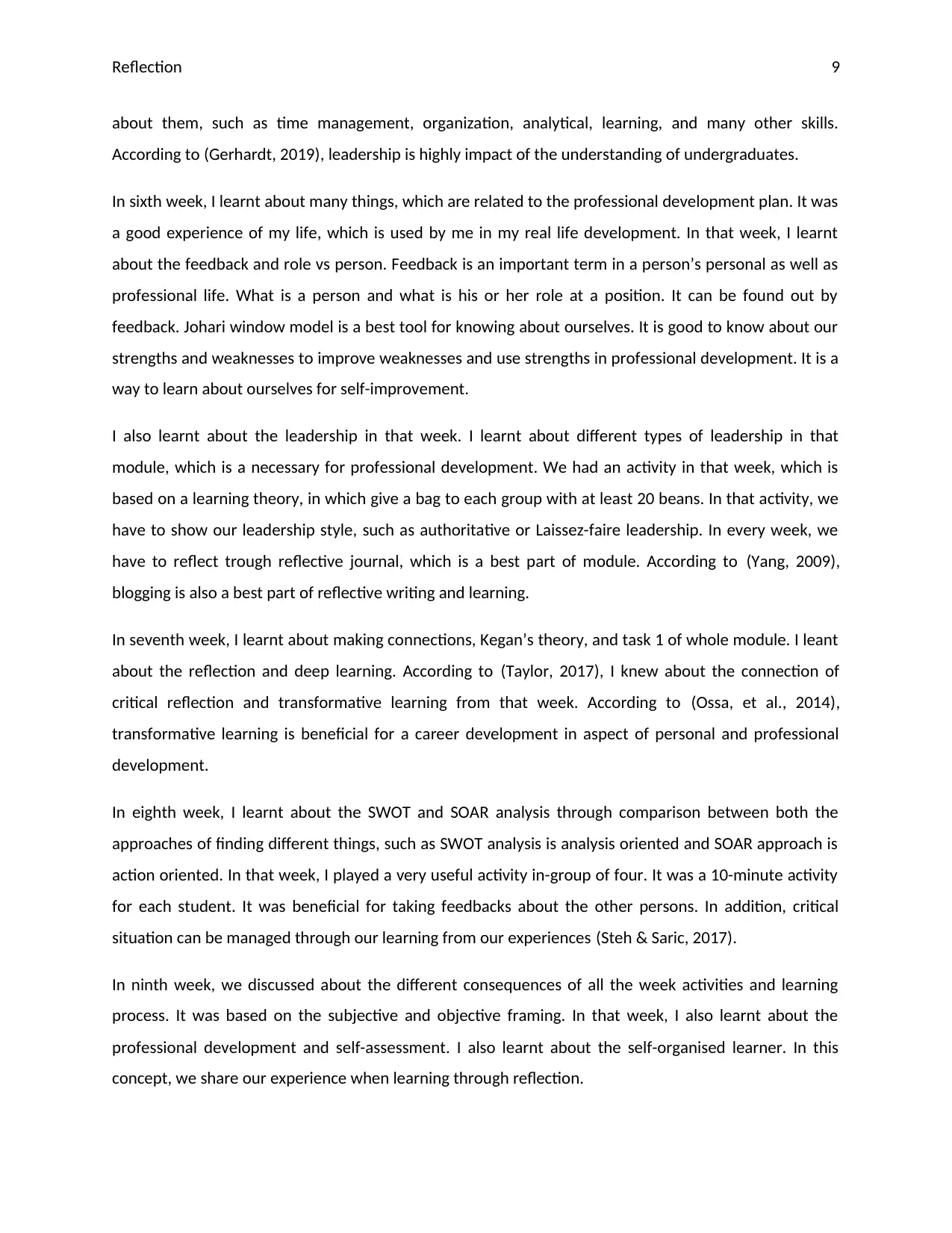
Reflection 9
about them, such as time management, organization, analytical, learning, and many other skills.
According to (Gerhardt, 2019), leadership is highly impact of the understanding of undergraduates.
In sixth week, I learnt about many things, which are related to the professional development plan. It was
a good experience of my life, which is used by me in my real life development. In that week, I learnt
about the feedback and role vs person. Feedback is an important term in a person’s personal as well as
professional life. What is a person and what is his or her role at a position. It can be found out by
feedback. Johari window model is a best tool for knowing about ourselves. It is good to know about our
strengths and weaknesses to improve weaknesses and use strengths in professional development. It is a
way to learn about ourselves for self-improvement.
I also learnt about the leadership in that week. I learnt about different types of leadership in that
module, which is a necessary for professional development. We had an activity in that week, which is
based on a learning theory, in which give a bag to each group with at least 20 beans. In that activity, we
have to show our leadership style, such as authoritative or Laissez-faire leadership. In every week, we
have to reflect trough reflective journal, which is a best part of module. According to (Yang, 2009),
blogging is also a best part of reflective writing and learning.
In seventh week, I learnt about making connections, Kegan’s theory, and task 1 of whole module. I leant
about the reflection and deep learning. According to (Taylor, 2017), I knew about the connection of
critical reflection and transformative learning from that week. According to (Ossa, et al., 2014),
transformative learning is beneficial for a career development in aspect of personal and professional
development.
In eighth week, I learnt about the SWOT and SOAR analysis through comparison between both the
approaches of finding different things, such as SWOT analysis is analysis oriented and SOAR approach is
action oriented. In that week, I played a very useful activity in-group of four. It was a 10-minute activity
for each student. It was beneficial for taking feedbacks about the other persons. In addition, critical
situation can be managed through our learning from our experiences (Steh & Saric, 2017).
In ninth week, we discussed about the different consequences of all the week activities and learning
process. It was based on the subjective and objective framing. In that week, I also learnt about the
professional development and self-assessment. I also learnt about the self-organised learner. In this
concept, we share our experience when learning through reflection.
about them, such as time management, organization, analytical, learning, and many other skills.
According to (Gerhardt, 2019), leadership is highly impact of the understanding of undergraduates.
In sixth week, I learnt about many things, which are related to the professional development plan. It was
a good experience of my life, which is used by me in my real life development. In that week, I learnt
about the feedback and role vs person. Feedback is an important term in a person’s personal as well as
professional life. What is a person and what is his or her role at a position. It can be found out by
feedback. Johari window model is a best tool for knowing about ourselves. It is good to know about our
strengths and weaknesses to improve weaknesses and use strengths in professional development. It is a
way to learn about ourselves for self-improvement.
I also learnt about the leadership in that week. I learnt about different types of leadership in that
module, which is a necessary for professional development. We had an activity in that week, which is
based on a learning theory, in which give a bag to each group with at least 20 beans. In that activity, we
have to show our leadership style, such as authoritative or Laissez-faire leadership. In every week, we
have to reflect trough reflective journal, which is a best part of module. According to (Yang, 2009),
blogging is also a best part of reflective writing and learning.
In seventh week, I learnt about making connections, Kegan’s theory, and task 1 of whole module. I leant
about the reflection and deep learning. According to (Taylor, 2017), I knew about the connection of
critical reflection and transformative learning from that week. According to (Ossa, et al., 2014),
transformative learning is beneficial for a career development in aspect of personal and professional
development.
In eighth week, I learnt about the SWOT and SOAR analysis through comparison between both the
approaches of finding different things, such as SWOT analysis is analysis oriented and SOAR approach is
action oriented. In that week, I played a very useful activity in-group of four. It was a 10-minute activity
for each student. It was beneficial for taking feedbacks about the other persons. In addition, critical
situation can be managed through our learning from our experiences (Steh & Saric, 2017).
In ninth week, we discussed about the different consequences of all the week activities and learning
process. It was based on the subjective and objective framing. In that week, I also learnt about the
professional development and self-assessment. I also learnt about the self-organised learner. In this
concept, we share our experience when learning through reflection.
Paraphrase This Document
Need a fresh take? Get an instant paraphrase of this document with our AI Paraphraser
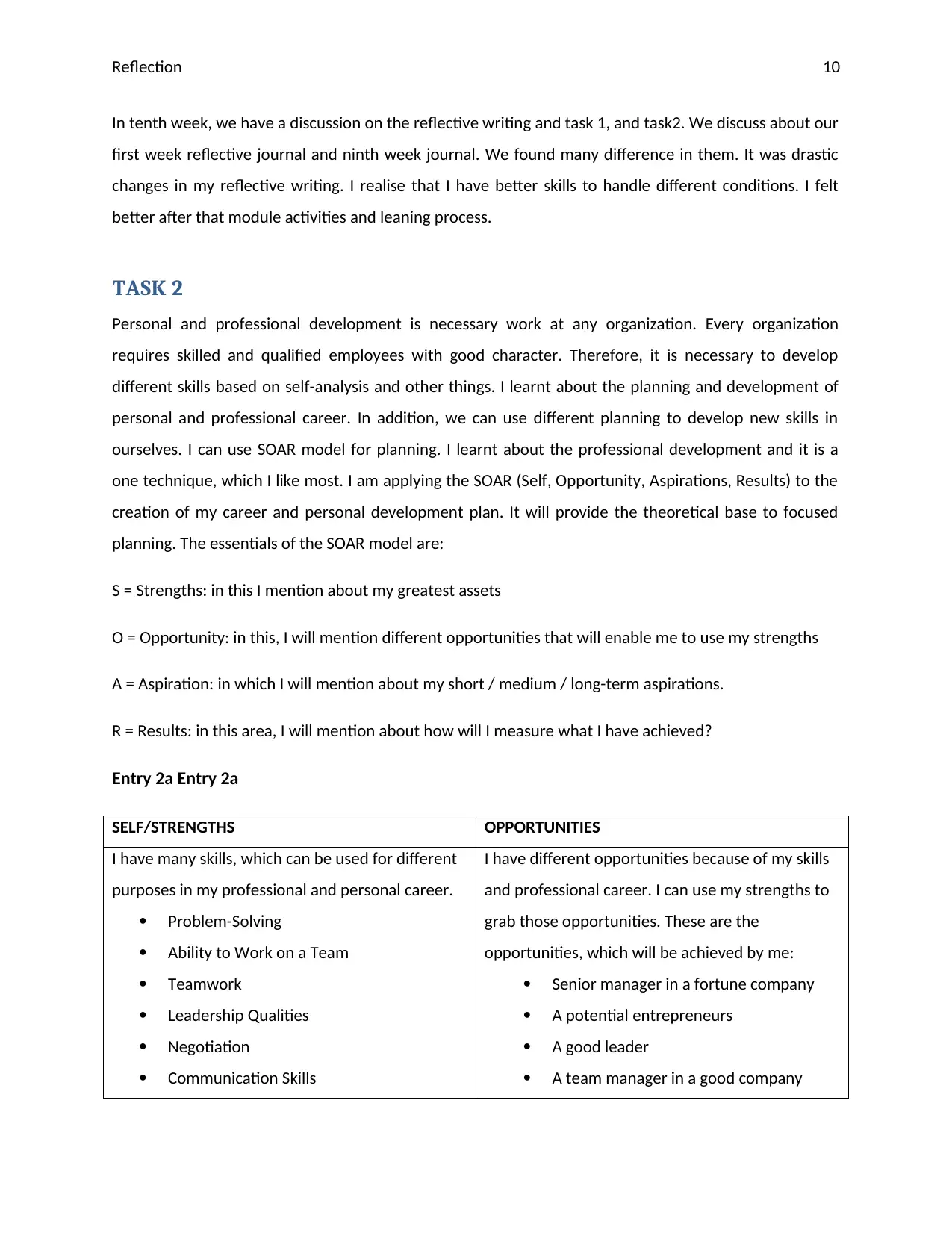
Reflection 10
In tenth week, we have a discussion on the reflective writing and task 1, and task2. We discuss about our
first week reflective journal and ninth week journal. We found many difference in them. It was drastic
changes in my reflective writing. I realise that I have better skills to handle different conditions. I felt
better after that module activities and leaning process.
TASK 2
Personal and professional development is necessary work at any organization. Every organization
requires skilled and qualified employees with good character. Therefore, it is necessary to develop
different skills based on self-analysis and other things. I learnt about the planning and development of
personal and professional career. In addition, we can use different planning to develop new skills in
ourselves. I can use SOAR model for planning. I learnt about the professional development and it is a
one technique, which I like most. I am applying the SOAR (Self, Opportunity, Aspirations, Results) to the
creation of my career and personal development plan. It will provide the theoretical base to focused
planning. The essentials of the SOAR model are:
S = Strengths: in this I mention about my greatest assets
O = Opportunity: in this, I will mention different opportunities that will enable me to use my strengths
A = Aspiration: in which I will mention about my short / medium / long-term aspirations.
R = Results: in this area, I will mention about how will I measure what I have achieved?
Entry 2a Entry 2a
SELF/STRENGTHS OPPORTUNITIES
I have many skills, which can be used for different
purposes in my professional and personal career.
Problem-Solving
Ability to Work on a Team
Teamwork
Leadership Qualities
Negotiation
Communication Skills
I have different opportunities because of my skills
and professional career. I can use my strengths to
grab those opportunities. These are the
opportunities, which will be achieved by me:
Senior manager in a fortune company
A potential entrepreneurs
A good leader
A team manager in a good company
In tenth week, we have a discussion on the reflective writing and task 1, and task2. We discuss about our
first week reflective journal and ninth week journal. We found many difference in them. It was drastic
changes in my reflective writing. I realise that I have better skills to handle different conditions. I felt
better after that module activities and leaning process.
TASK 2
Personal and professional development is necessary work at any organization. Every organization
requires skilled and qualified employees with good character. Therefore, it is necessary to develop
different skills based on self-analysis and other things. I learnt about the planning and development of
personal and professional career. In addition, we can use different planning to develop new skills in
ourselves. I can use SOAR model for planning. I learnt about the professional development and it is a
one technique, which I like most. I am applying the SOAR (Self, Opportunity, Aspirations, Results) to the
creation of my career and personal development plan. It will provide the theoretical base to focused
planning. The essentials of the SOAR model are:
S = Strengths: in this I mention about my greatest assets
O = Opportunity: in this, I will mention different opportunities that will enable me to use my strengths
A = Aspiration: in which I will mention about my short / medium / long-term aspirations.
R = Results: in this area, I will mention about how will I measure what I have achieved?
Entry 2a Entry 2a
SELF/STRENGTHS OPPORTUNITIES
I have many skills, which can be used for different
purposes in my professional and personal career.
Problem-Solving
Ability to Work on a Team
Teamwork
Leadership Qualities
Negotiation
Communication Skills
I have different opportunities because of my skills
and professional career. I can use my strengths to
grab those opportunities. These are the
opportunities, which will be achieved by me:
Senior manager in a fortune company
A potential entrepreneurs
A good leader
A team manager in a good company
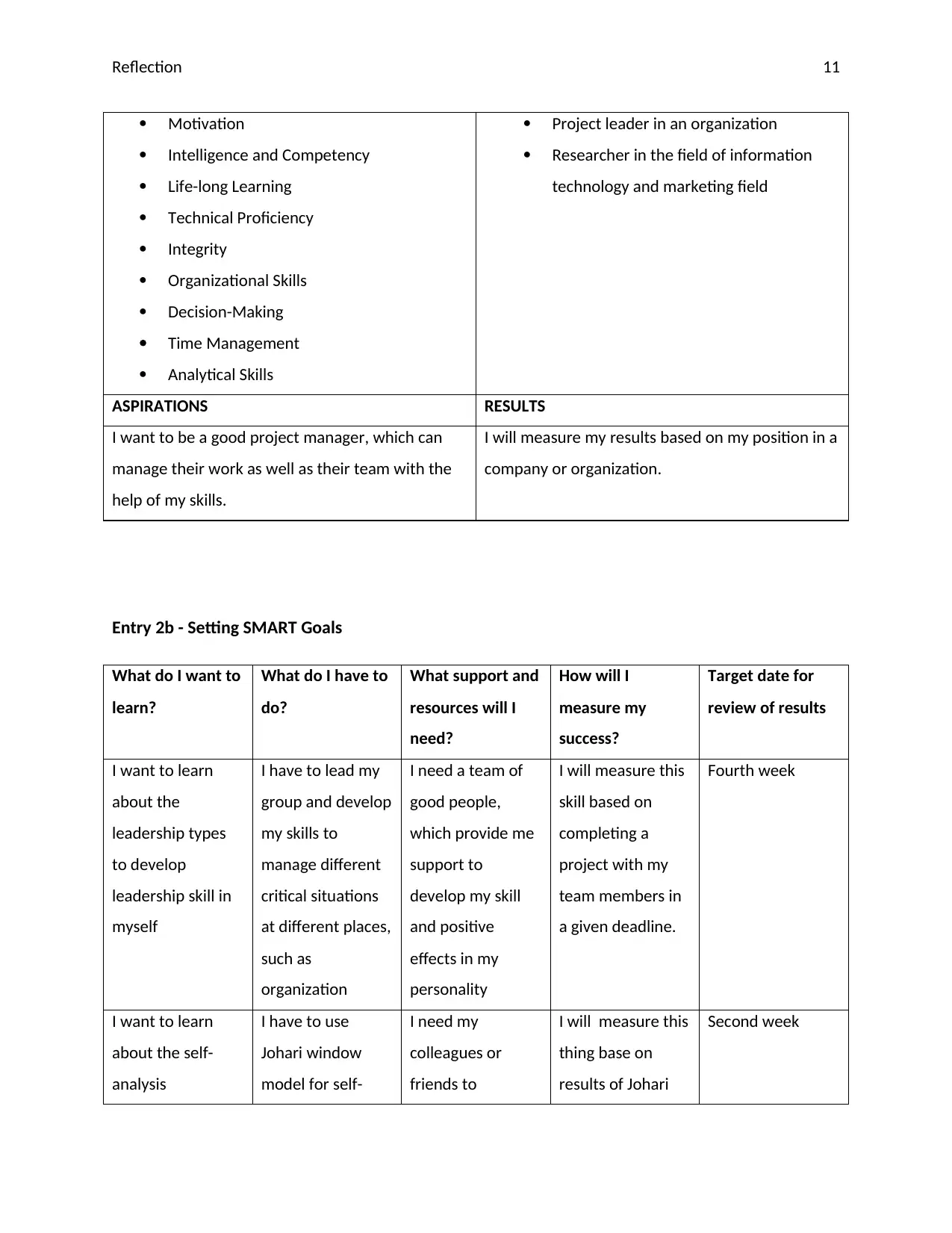
Reflection 11
Motivation
Intelligence and Competency
Life-long Learning
Technical Proficiency
Integrity
Organizational Skills
Decision-Making
Time Management
Analytical Skills
Project leader in an organization
Researcher in the field of information
technology and marketing field
ASPIRATIONS RESULTS
I want to be a good project manager, which can
manage their work as well as their team with the
help of my skills.
I will measure my results based on my position in a
company or organization.
Entry 2b - Setting SMART Goals
What do I want to
learn?
What do I have to
do?
What support and
resources will I
need?
How will I
measure my
success?
Target date for
review of results
I want to learn
about the
leadership types
to develop
leadership skill in
myself
I have to lead my
group and develop
my skills to
manage different
critical situations
at different places,
such as
organization
I need a team of
good people,
which provide me
support to
develop my skill
and positive
effects in my
personality
I will measure this
skill based on
completing a
project with my
team members in
a given deadline.
Fourth week
I want to learn
about the self-
analysis
I have to use
Johari window
model for self-
I need my
colleagues or
friends to
I will measure this
thing base on
results of Johari
Second week
Motivation
Intelligence and Competency
Life-long Learning
Technical Proficiency
Integrity
Organizational Skills
Decision-Making
Time Management
Analytical Skills
Project leader in an organization
Researcher in the field of information
technology and marketing field
ASPIRATIONS RESULTS
I want to be a good project manager, which can
manage their work as well as their team with the
help of my skills.
I will measure my results based on my position in a
company or organization.
Entry 2b - Setting SMART Goals
What do I want to
learn?
What do I have to
do?
What support and
resources will I
need?
How will I
measure my
success?
Target date for
review of results
I want to learn
about the
leadership types
to develop
leadership skill in
myself
I have to lead my
group and develop
my skills to
manage different
critical situations
at different places,
such as
organization
I need a team of
good people,
which provide me
support to
develop my skill
and positive
effects in my
personality
I will measure this
skill based on
completing a
project with my
team members in
a given deadline.
Fourth week
I want to learn
about the self-
analysis
I have to use
Johari window
model for self-
I need my
colleagues or
friends to
I will measure this
thing base on
results of Johari
Second week
⊘ This is a preview!⊘
Do you want full access?
Subscribe today to unlock all pages.

Trusted by 1+ million students worldwide
1 out of 17